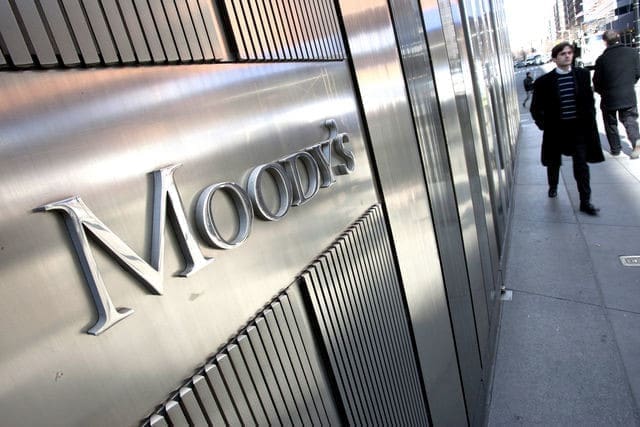Ghana has received a credit rating boost from Moody’s Investors Service, which upgraded the country’s long-term credit ratings and shifted its outlook to positive, citing successful debt relief efforts and improving fiscal conditions.
The rating agency moved Ghana’s foreign currency credit rating to Caa2 from Ca, while upgrading its local currency rating from Caa3 to Caa2. More significantly, Moody’s changed Ghana’s outlook from stable to positive, suggesting the possibility of further upgrades if current economic trends continue.
The upgrade reflects Ghana’s completion of a comprehensive debt restructuring under the G20 Common Framework, which concluded with a eurobond exchange in October. That restructuring included a substantial 37% haircut on most eurobond principal, along with the rescheduling of both local currency obligations and bilateral official-sector debt.
These measures have already shown results. Ghana’s government debt burden has dropped from 93% of GDP in 2022 to an expected 81% this year, providing some breathing room for public finances that had been stretched dangerously thin.
Still, Moody’s made clear that Ghana isn’t out of the woods yet. The country faces several persistent challenges that could derail progress. Debt payments are resuming after the restructuring, and the government remains heavily reliant on high-interest short-term Treasury bills to meet its financing needs. With national elections scheduled for December, fiscal pressures are mounting, keeping liquidity risks elevated.
There’s also the currency exposure problem. Nearly half of Ghana’s government debt is denominated in foreign currency, which means any significant cedi volatility could quickly worsen the debt situation. It’s a vulnerability that limits how aggressively policymakers can respond to economic shocks.
But Moody’s sees reasons for cautious optimism. The positive outlook suggests these risks might diminish if Ghana can maintain fiscal discipline through its International Monetary Fund-backed programme. The country’s robust gold exports provide a steady source of foreign exchange, while continued access to official-sector funding offers a financial cushion.
What makes this upgrade particularly noteworthy is what it could mean practically for Ghana’s economy. Lower credit risk typically translates to lower borrowing costs, whether from official lenders or through new bond issuances. That matters enormously for a government that’s been paying premium rates to access capital markets.
The upgrade also signals improved investor confidence, which could encourage both domestic and foreign investment. Moody’s noted that Ghana’s relatively strong institutions and the transparent way officials handled the debt restructuring have positioned the country well for potentially rapid improvements in creditworthiness.
However, the agency pointed out ongoing social and environmental challenges. Ghana faces moderate to high risks from climate-related shocks affecting agriculture, limited access to quality housing and healthcare, and constrained fiscal policy options due to persistent debt service obligations. These factors contributed to an Environmental, Social, and Governance Credit Impact Score of 5, reflecting substantial pressures on the country’s institutional framework.
Moody’s also raised Ghana’s local and foreign currency country ceilings to B2 and B3, respectively, aligning them with the sovereign rating upgrade. Existing debt instruments weren’t immediately affected by the changes.
Looking ahead, further upgrades will depend on Ghana’s ability to maintain fiscal consolidation and achieve a primary surplus while reducing liquidity risks. The flip side is equally clear: any backsliding, such as accumulating payment arrears or losing access to funding sources, could quickly reverse the gains.
For now, though, the upgrade represents a vote of confidence in Ghana’s economic management during a difficult period. Whether that confidence proves justified will depend on the government’s ability to navigate election-year pressures while sticking to its fiscal commitments and maintaining the reform momentum that earned this upgrade in the first place.
Source: newsghana.com.gh











